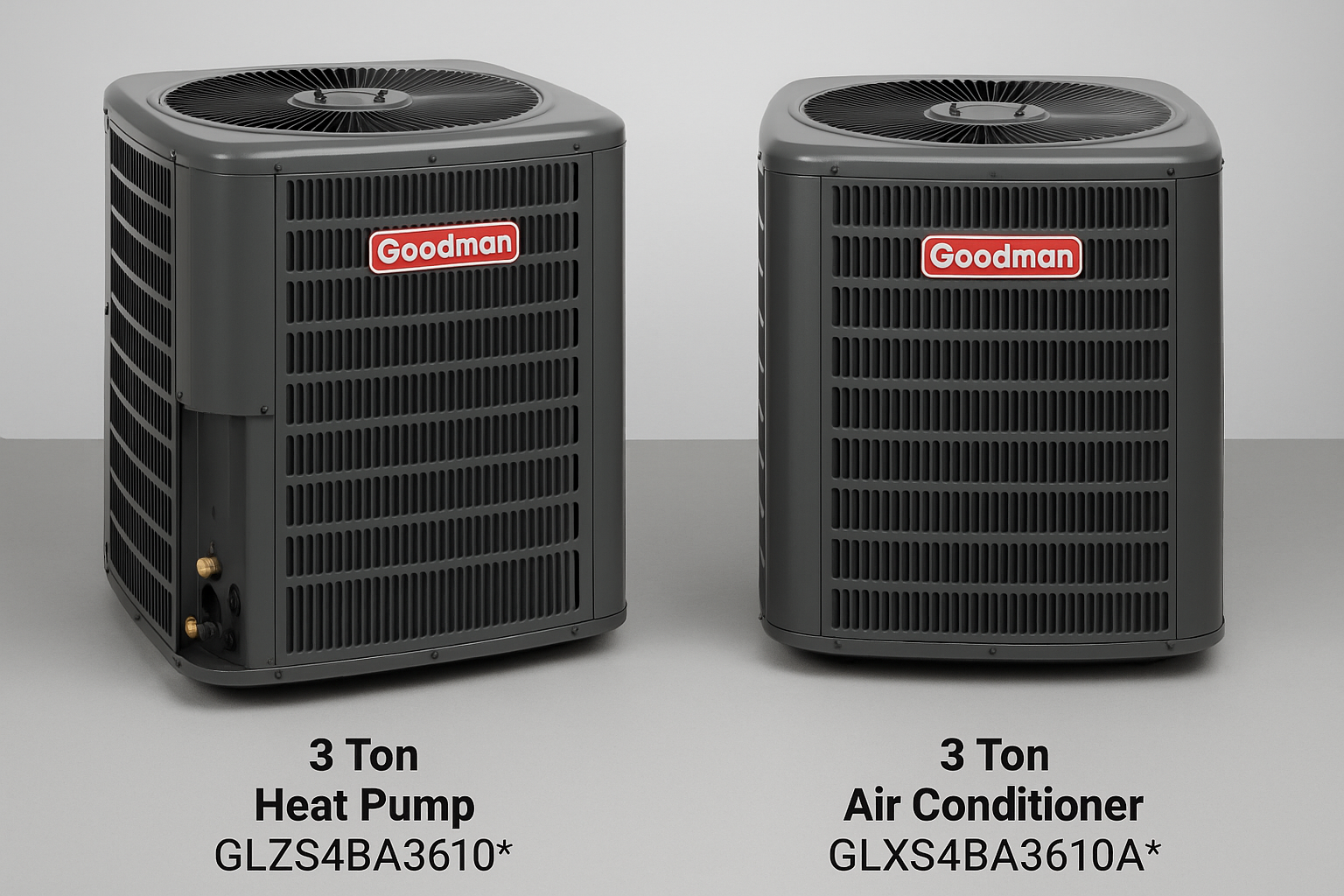As homeowners look for efficient, eco-friendly climate control, many are considering heat pump air conditioners as alternatives to traditional straight cool systems. But what exactly is the difference? And is a 3-ton heat pump a better investment for your home than a standard 3-ton AC?
In this guide, we’ll explore how these systems work, compare their performance, and help you decide which 3-ton configuration makes the most sense based on your climate, comfort preferences, and budget.
What’s the Difference? Heat Pump vs. Straight Cool
| Feature | 3 Ton Heat Pump | 3 Ton Straight Cool AC |
|---|---|---|
| Cooling Mode | Yes | Yes |
| Heating Mode | Yes (reverses refrigerant flow) | No (requires separate furnace) |
| Energy Source (Heat) | Electricity | Natural gas, propane, or electric strip |
| Best Use Case | Moderate climates | Hot climates with separate heating |
| Initial Cost | Slightly higher | Typically lower |
To learn more, explore the U.S. Department of Energy’s Heat Pump Overview.
How a Heat Pump Works
A heat pump cools like a standard AC in summer by extracting indoor heat and releasing it outdoors. In winter, the process reverses: it absorbs heat from outdoor air and brings it inside. This dual-function system is efficient in temperatures above 30–35°F and eliminates the need for a separate furnace in mild climates.
Watch the Energy.gov video explainer for a clear visual breakdown.
Efficiency and Performance
Modern heat pumps and straight cool ACs often use the same SEER2 (cooling) and HSPF2 (heating) standards. In cooling mode, both can offer:
-
SEER2 ratings of 14.3 to 20+
-
Variable-speed compressors
-
Smart thermostat compatibility
However, heat pumps also include an HSPF2 (Heating Seasonal Performance Factor 2) rating, which indicates heating efficiency.
Learn more at the AHRI certification directory.
Advantages of a 3 Ton Heat Pump System
-
Heating and cooling in one system
-
Lower carbon emissions than fossil-fuel furnaces
-
Eligible for more rebates and tax credits
-
Great for all-electric homes or moderate climates
The ENERGY STAR Heat Pump Guide highlights how these systems perform year-round.
Advantages of a Straight Cool 3 Ton System
-
Lower upfront cost
-
Better heating reliability in freezing temperatures (via gas furnace)
-
Less wear on the outdoor condenser unit
-
More familiar for HVAC technicians in cold climates
Straight cool systems may be preferable in areas where winter lows drop well below freezing and a gas furnace is already in place.
Climate Considerations
-
Best for Heat Pumps: Southeast, Pacific Coast, and parts of Southwest where winters are mild
-
Best for Straight Cool: Midwest, Northeast, and Mountain regions with frequent sub-freezing temperatures
View the DOE Climate Zone Map to determine which type aligns with your region.
Incentives and Rebates
Heat pumps generally qualify for:
-
Federal Energy Tax Credits (up to $2,000 under the Inflation Reduction Act)
-
State utility rebates
-
Energy-efficiency grants and green energy loans
Search DSIRE for current rebates by zip code.
Straight cool ACs may also qualify for utility incentives, but generally lower than those for heat pumps.
Cost Comparison
| Factor | 3 Ton Heat Pump | 3 Ton Straight Cool AC |
|---|---|---|
| Unit Cost | $3,500–$6,000 | $2,800–$5,000 |
| Install Cost (avg.) | $4,500–$8,000 | $4,000–$7,000 |
| Annual Operating Cost | Lower in mild climates | Lower in cold climates |
| Eligible Rebates | Up to $2,000+ | Up to $600 |
Conclusion: Which System Is Right for You?
If you live in a temperate climate and prefer an all-in-one electric solution, a 3-ton heat pump system is hard to beat. It provides efficient cooling and heating, supports cleaner energy goals, and offers significant rebate opportunities.
However, if you already rely on a gas furnace and live in a cold-weather region, a traditional straight cool 3-ton AC may be more practical and cost-effective.
Browse our range of 3 Ton AC Systems, including both heat pump and straight cool configurations. Not sure what suits your region? Contact our team for personalized system recommendations based on your zip code and energy goals.







